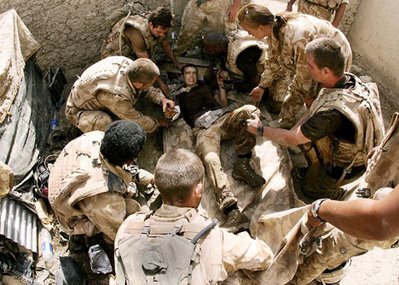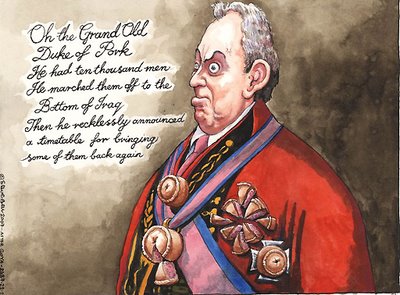"Heroes" without a cause.
 The other side of heroism: Davey Graham injured after being shot in the abdomen during a "Taliban" ambush.
The other side of heroism: Davey Graham injured after being shot in the abdomen during a "Taliban" ambush.Last month, the Grauniad ran a couple of amusing columns by David Marsh, the editor of the style guide, on the various complaints that come into the readers' editor on the over or wrong usage of words. Top of the list came iconic and ironic, but I'm sure that it'd be easy to add numerous others to that list. As pointed out in the comments, Private Eye until recently had a box every issue titled the "neophiliacs", which listed every usage of the tired "thing" is the new "thing", and has now taken to highlighting the horrible abuse of the word "solutions", invariably by business trying to make their banal and boring services sound just ever so slightly more exciting.
Hero is certainly a description that could be added to that list of abused words. Just what makes someone a hero? Watching Match of the Day, whenever a footballer who's just moved clubs scores his debut goal, the commentator invariably remarks on how he's become the fans' newest hero. We tend to apply it across the board, especially to public servants, whether they be police officers, firemen, nurses (although they're more usually referred to as angels) or soldiers. It also usually gets taken out of its box when someone dies, usually in tragic circumstances, whether they be Garry Newlove, the father who confronted teenagers vandalising the digger he'd hired and who died after being attacked, described by the Sun as a "have-a-go" hero, when all he was doing was what most ordinary people would have done, or Mitchell Henderson, a 13-year-old who killed himself after having his iPod stolen, subsequently referred to as "an hero" on the tributes to him on MySpace, which has fast become an internet meme used to describe anyone who commits suicide.
The line between being a hero and an idiot is one of those thin ones which is difficult to quantify. Today's Sun, trying its best to snatch victory for "Our Boys" from the jaws of general indifference, has perhaps come up with the best description of how close the line goes between the two, relating the story of a single-minded soldier:
Their courage was typified by rifleman Ben Sawyer, aged just 19.
A bullet smashed into his right hand during a rooftop firefight, ripping through tendons and bones.He has just returned to Basra after being declared fit for duty.
For those of us more interested in staying alive than in sacrificing life for no discernible rhyme or reason, especially when we've been brought up on a literary diet of Catch-22, Slaughterhouse Five and the war poets, all of which express the futility, madness and paranoia associated with armed conflict, it's difficult to assess where Ben Sawyer lies on the craziness/hero paradigm.
It's easy to be cynical, especially when you were opposed to the war from the beginning about the achievements and actions of the British troops, but the individual accounts of astonishing courage related in the Scum's article, withstanding Sawyer's apparent selflessness bordering on insanity are mostly reminiscent of tales passed down into military folklore. The 30 soldiers using cooking oil to lubricate their rifles will remind anyone who's read Antony Beevor's account of the battle of Stalingrad of the trapped or surrounded Soviet troops who often had to resort to using their own urine to do the same to their guns.
Even so, this is still a report bordering on the delusional, descending on occasion into empty adulation of an armed force which didn't always manage to live up to the sentiments expressed in Tim Collins' speech before the beginning of the conflict. For the army (or Tom Newton Dunn, the Scum's defence editor) to pretend that it was their offensives against the Mahdi army that forced it into negotiations is laughable: more that the British forces had to go cap in hand begging that their exit from the city go ahead without more violence aimed against them when at their most vulnerable. Dunn seems to have fallen victim to willful myopia when describing how Basra was quiet yesterday, not willing to make the connection that the exit of British troops just might have had something to do with it. If the figures quoted in the article on the number of roadside bombs are also accurate, it seems also to acquit Iran of major involvement in supplying most of the devices: if the "daisy-chain" armaments supplied are as deadly as the media have hyped up they are, either the militias weren't using them, instead relying on the other improvised devices which often cause little to no damage when targeted against American vehicles, as countless insurgent videos testify, or they're just as hopeless as most of the others are.
To bring this post full circle, it seems that whoever wrote today's Sun leader could do with learning how not to abuse words that they obviously don't understand:
Or the introduction of draconian human rights laws without consultation.
Answers on a postcard as to how "human rights laws" could possibly ever be described as draconian. Perhaps the Sun really ought to stick to treating its readers like idiots with words no longer than a couple of syllables; it seems they find them difficult to get to grips with as well.
Labels: Basra, British troop withdrawal, heroes, language abuse, Scum-watch, Sun-watch


